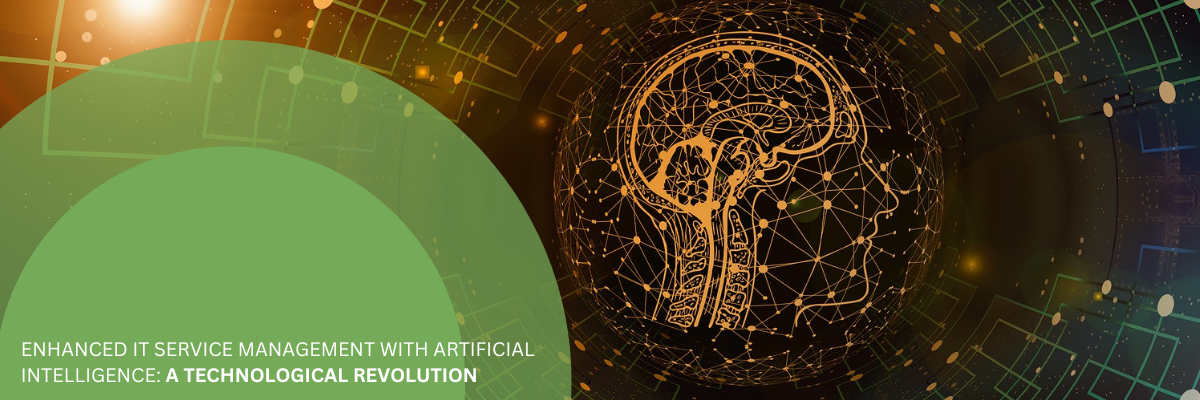In the realm of IT Service Management (ITSM), Artificial Intelligence (AI) has emerged as a valuable ally rather than a replacement for human-provided IT services. While AI has undoubtedly reshaped ITSM by streamlining processes and improving efficiency, its role remains one of support and augmentation rather than complete substitution. Human IT professionals bring unique qualities to the table, including adaptability, creativity, and a deep understanding of evolving business needs.
While Artificial Intelligence (AI) in IT Service Management (ITSM ) only works coupled with the skills and understanding of your business with human engagement provided by you and your IT service provider, its role it cannot be overstated. AI has emerged as a game-changer, transforming how businesses manage their IT services and support.
Understanding IT Service Management
Before we dive into the exciting world of AI, let’s first think about what is IT Service Management. At its core, ITSM is the discipline that focuses on designing, delivering, managing, and improving the IT services an organisation provides to its customers. It involves a range of activities, from incident and problem resolution to change management and asset tracking. ITSM strives to ensure that IT services align with business needs and deliver value to the organisation.
AI’s Evolution in ITSM
Traditionally, ITSM heavily relied on human intervention to resolve issues and manage services. While skilled IT professionals remain indispensable, AI has emerged as a powerful ally, capable of enhancing their capabilities and efficiency. Here’s how AI is revolutionising ITSM:
Efficient Incident Management: AI-powered chatbots and virtual assistants can quickly resolve common IT issues and answer user queries, providing immediate assistance round the clock. This reduces the workload on IT support staff, allowing them to focus on more complex tasks.
Predictive Analytics: AI can analyse historical data to predict potential IT issues before they escalate. By identifying patterns and anomalies, AI helps organisations take proactive measures to prevent service disruptions.
Automation of Routine Tasks: Mundane and repetitive tasks, such as password resets and software updates, can be automated through AI-driven workflows. This not only saves time but also reduces the chances of human error.
Natural Language Processing (NLP): AI-powered chatbots equipped with NLP capabilities can understand and respond to user queries in a conversational manner. This enhances the user experience and reduces the need for manual intervention.
Knowledge Management: AI can index and categorise vast amounts of documentation, making it easier for IT professionals to access the information they need when troubleshooting issues or implementing changes.
Service Request Automation: AI can streamline the process of handling service requests, ensuring they are routed to the appropriate teams and resolved efficiently.
Performance Optimisation: AI can continuously monitor IT infrastructure and suggest optimisations to improve system performance and resource utilisation.
The Benefits of AI in ITSM
Cost Efficiency: By automating routine tasks and improving incident resolution times, AI reduces operational costs and optimises resource utilisation.
Enhanced User Experience: AI-driven chatbots provide instant support, enhancing the overall user experience and reducing user frustration.
Predictive Maintenance: AI’s predictive capabilities help prevent service disruptions, minimising downtime and ensuring business continuity.
Data-Driven Decision Making: AI provides valuable insights from data analysis, enabling informed decision-making and strategic planning.
Scalability: AI systems can scale effortlessly to handle growing workloads and adapt to changing business requirements.
The Future of AI in ITSM
As AI technology continues to evolve, its role in ITSM will only become more significant. We can expect even greater automation, more advanced predictive analytics, and increasingly sophisticated virtual assistants.
Nevertheless, while Artificial Intelligence (AI) undoubtedly stands as a potent tool that enhances IT services, it’s crucial to recognise that it won’t completely replace human-provided IT services. Human IT professionals bring to the table a distinctive set of skills and attributes, encompassing creativity, empathy, and the capacity to grasp intricate and evolving business requirements. These qualities prove indispensable for tasks demanding subtle decision-making, adept problem-solving, and the ability to adapt to unique or unanticipated scenarios.
Also, IT services frequently entail interactions with end-users, where human-to-human communication and comprehension play a pivotal role in resolving issues and delivering a top-tier user experience.
So, while AI excels at automating routine tasks and furnishing invaluable insights, the optimal approach for furnishing comprehensive and user-centric IT services hinges on the harmonious collaboration between AI and human IT professionals. If you wish to explore how Yunatech can manage your business IT needs, please do get in touch.

